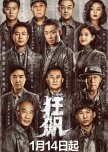This review may contain spoilers
The knockout
A socioeconomic phenomenon in many of millennial and Gen Z Chinese who enjoy watching the hottest Chinese crime drama of 2023, "The Knockout", or "Kuangbiao" in Chinese.
On the surface, ‘The Knockout’ is just like any other Chinese cop drama - a propaganda hit – bad guys will whatever fail, due to the finest leadership with pure (and unhuman) justice of humanity on the right side of history.
But this time, young Chinese especially admire the head mafia - Mr. Gao, or "Gao Qiqiang," in the series. Although a ruthless and violent criminal, Gao is also a warm, loving father and husband. The paradox of his character is that it is precisely the mix of warmth and robustness of his humanity that makes him appear superhuman and extremely loyal to his wife.
The popularity of the drama could be one piece of evidence of the recent year’s slowdown of the Chinese economy: young graduates, the covid-generation, or so-called ‘Online Course Generation’ (OCGs), particularly those from families at both ends of the socioeconomic spectrum, have begun to yearn for a return to the ‘Good Old Days’ in China, during the years in which several generations of Chinese grew up - or in case, ‘knocking out’ - the country was entering a dizzying, and, at times, reckless phase of rapid growth characterized by severe environmental pollution and political corruption. This followed a period of political freeze after the student movement in the late 1980s - a time when, although the Party strictly controlled political life, a certain degree of freedom was tacitly allowed. Dissenting and authoritarian scholars acquiesced to openly debate, bloggers and commercial news agencies were able to reflect on government policy, and private dinner jokes about politicians and Chinese social taboos were not subject to public punishment. Those freedoms that were once so scarce and pitiable now also fade into ashes in today's Chinese society.
Reflecting on Mr. Gao's rise to power, socioeconomic scholars in the West may observe an era when a hard-working, talented opportunist from the bottom of the Chinese social pyramid, without 996 - the rat-race workplace culture, with no stunning but useless high qualifications, without a powerful family background, without an internship at McKinsey, or smug transnational studying experience, could still achieve success in China through personal struggle and the opportunities afforded by the times.
On the surface, ‘The Knockout’ is just like any other Chinese cop drama - a propaganda hit – bad guys will whatever fail, due to the finest leadership with pure (and unhuman) justice of humanity on the right side of history.
But this time, young Chinese especially admire the head mafia - Mr. Gao, or "Gao Qiqiang," in the series. Although a ruthless and violent criminal, Gao is also a warm, loving father and husband. The paradox of his character is that it is precisely the mix of warmth and robustness of his humanity that makes him appear superhuman and extremely loyal to his wife.
The popularity of the drama could be one piece of evidence of the recent year’s slowdown of the Chinese economy: young graduates, the covid-generation, or so-called ‘Online Course Generation’ (OCGs), particularly those from families at both ends of the socioeconomic spectrum, have begun to yearn for a return to the ‘Good Old Days’ in China, during the years in which several generations of Chinese grew up - or in case, ‘knocking out’ - the country was entering a dizzying, and, at times, reckless phase of rapid growth characterized by severe environmental pollution and political corruption. This followed a period of political freeze after the student movement in the late 1980s - a time when, although the Party strictly controlled political life, a certain degree of freedom was tacitly allowed. Dissenting and authoritarian scholars acquiesced to openly debate, bloggers and commercial news agencies were able to reflect on government policy, and private dinner jokes about politicians and Chinese social taboos were not subject to public punishment. Those freedoms that were once so scarce and pitiable now also fade into ashes in today's Chinese society.
Reflecting on Mr. Gao's rise to power, socioeconomic scholars in the West may observe an era when a hard-working, talented opportunist from the bottom of the Chinese social pyramid, without 996 - the rat-race workplace culture, with no stunning but useless high qualifications, without a powerful family background, without an internship at McKinsey, or smug transnational studying experience, could still achieve success in China through personal struggle and the opportunities afforded by the times.
Was this review helpful to you?



